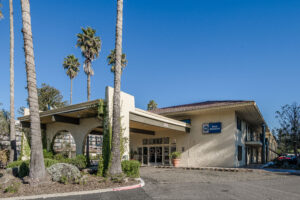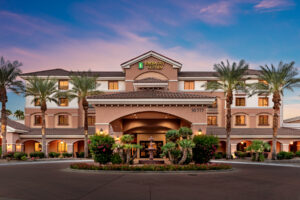Experts hope for a quick recovery for LA’s tourism economy
Experts hope for a quick recovery for LA’s tourism economy
Michelle Lhooq | Bloomberg
Published 11:03 a.m. ET Feb. 17, 2025
On a rainy afternoon in early February, Hodari Sababu, the cowboy-hat-donning owner of LA Hood Life Tours, isn’t running his usual assortment of van excursions to hip-hop and Hollywood landmarks. “People are scared to come to LA right now,” he says, seated at a booth on Hollywood Boulevard. He adds that his small business has lost $12,000 because of customer no-shows, cancellations and refunds since Jan. 7, when wildfires first broke out across Los Angeles, eventually burning through 40,000 acres and killing 29 people.
Normally, it would already be a slow month for Sababu, with low season running from January to March. That makes any additional hit to business difficult to absorb in the short term. But the tour operator is among a large number of local travel industry professionals who are predicting that this month’s anomalies will soon give way to a quick travel recovery citywide. Puffing a cigar and twirling a toy water gun, he says, “Come spring break, we hope to be busy again.”
Almost a dozen hoteliers, tourism operators and analysts who spoke to Bloomberg shared an equally bullish outlook on LA’s travel recovery, thanks in part to the city’s enormous cultural power and private wealth. The most pessimistic among them expected regular business to resume by the end of the year.
Sababu is hardly the only hospitality entrepreneur currently feeling the burn; more than 530,000 Angelenos and 1,100 businesses throughout the city depend on tourism for their livelihoods. One month after the fires broke out, and one week after they were fully contained, souvenir shops along the attraction-lined Hollywood Walk of Fame remained mostly devoid of tourists.
Ready for visitors
Natural disasters tend to deter holidaymakers from visiting affected areas. But in the immediate aftermath of the fire, occupancy in Los Angeles hotels jumped, from 59.3% to 65%, as luxury properties became emergency shelters for evacuees and first responders. According to the Hotel Association of Los Angeles, more than 50 hotels across the city offered discounts to fire victims; celebrity hangout Chateau Marmont even offered complimentary two-night stays at its private cottages, which start at $1,165 per night, to local firefighters.
Travelers worried they will displace locals from their temporary shelters can rest assured that period has come to a close. Firefighters are no longer sleeping on the front lines, with all fires contained as of Feb. 1. And given that traditional hotel rooms lack the kitchens and separated bedrooms needed for many longer-term stays, hoteliers say displaced Angelenos who initially flooded the city’s hotels are now moving into rentals.
As a result, marketing organization Visit California has more than quadrupled its $1 million media budget to emphasize that LA is ready for visitors. All of the city’s major attractions and landmarks (except for the Getty Villa) are open, no hotels burned in the fire, and the burn area ultimately affected just 2% of the city’s overall acreage, mainly in the residential areas of Pacific Palisades, Altadena and Pasadena.
Tourism, the organizations say, is one of the county’s top five employment sectors. It’s also a critical economic driver for California at large, bringing in a record-breaking $40.4 billion in revenue in 2023, as well as $3 billion in travel-related state and local tax revenue.
Even experts outside the tourism industry suggest that the LA travel economy may recover far more quickly than other sectors. “The impact on tourism would have been much bigger if the fires had occurred during the summer months,” explains Taner Osman, adjunct professor at the UCLA Luskin School of Public Affairs and co-founder of consulting firm Westwood Economics and Planning Associates. Not only did the fires occur “many months before peak season,” but tourist attractions are geographically dispersed “far and wide apart.” That contains the fires’ effects, “in that they do not stop people from visiting the region’s other tourist attractions.”
An optimistic outlook
Officially, analysts have determined that wildfire destruction will cost LA as much as $164 billion in destruction and take more than a year for cleanup crews to remove all debris and toxic waste. So the forecast that the travel industry will bounce back faster is welcome news as LA prepares for the 2026 FIFA World Cup, the 2027 Super Bowl and the 2028 Olympic Games-three global events that will require tourism infrastructure to be in tip-top shape.
An influx of private investment will also play a key role in LA’s recovery, with billionaire Rick Caruso pledging to donate millions and Gov. Gavin Newsom securing $100 million through private-sector fundraising. (Leading the effort with Newsom are Guggenheim Partners Chief Executive Officer Mark Walter, basketball legend Earvin “Magic” Johnson and sports executive Casey Wassermann.)
“Such a tremendous amount of private capital is going to make sure Los Angeles is successful in the short term, because there’s just not the stomach for LA to languish,” says Avi Brosh, founder of Palisociety, an independent hotel management company with eight properties across LA.
At Chateau Marmont lately, the scene has been unusually quiet-with staffers suspecting that many regulars have lost homes and left town. But the pandemic prepared local operators to maneuver through business slowdowns and even standstills. “Most hotel groups are pretty adept at managing staffing levels based on demand,” Brosh says, noting that January reservations were rebooked for February and beyond. “People have short memories,” he adds, predicting that February will still be “touch and go” but that by the second quarter of 2025, “LA will start to shine again.”
Other hoteliers say recovery is already well underway. “Based on conversations with our clients, LA looks on par with where it was last year,” says Alan Reay, president of Atlas Hospitality Group, a real estate agency that specializes in the sale of California hotels.
The situation in Malibu-an area directly affected by the fires-feels different. At the 47-room, five-star Malibu Beach Inn, most February and March reservations have been canceled or postponed until later in the year, says managing director Gregory Day.
More damaging to business, he says, is the fact that road access to Malibu Beach Inn has been unreliable. On Monday, Feb. 9, it was shut down indefinitely due to mudslides and toxic debris from the previous week’s rain. It hadn’t yet reopened by Thursday, Feb. 13, when more rainfall spurred evacuation warnings due to the risk of mudslides in the surrounding area. “How do businesses remain open? How does our staff get paid?” Day asks. As for when normalcy will return, he adds, it’s “impossible to say.”


